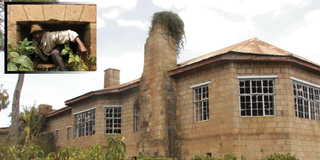Locals renew calls to turn colonial court to museum

Kinyahwe Colonial Courthouse in Kinagop Constituency. Inset: The caretaker, Mr Ndegwa Maina, emerges from an underground cell used to detain and torture Mau Mau freedom fighters and their sympathisers.
An old house rides the tide of time, grey stone rooted in red volcanic soil, bravely weathering its vicissitudes.
The Kinyahwe Colonial Courthouse stands at the foot of the Aberdare Forest in Kinangop, about six kilometres from the Njabini-Engineer highway.
Its facade is jaded and decrepit but, from its bowels, memories of a dark past struggle to rise to the surface — like the muffled din of a far-off storm, or the faded remnants of a troubling dream. It’s the faint cries of Mau Mau captives in the underground torture chambers, their voices crackling through the wooden floor separating the cells from the upper house, where their tormentors applaud in amusement as they sip expensive wine and feast on sundry delicacies.
But times have changed and the physical pain long-healed. Locals now want the building rehabilitated and turned into a museum — an archive for the Mau Mau struggle for freedom.
It’s been an years-long clarion call, recently revived by the demise of independence struggle icon Dedan Kimathi’s widow Mukami last week. During a meeting with Governor Kiarie Badilisha to plan for Mukami’s burial tomorrow, locals repeated the demand, saying, it would honour the memories of Dedan Kimathi and his wife.
“We are ready to have the struggle for independence documented. It has been discussed for a long time and this is the best time to have it done in honour of the late Mukami Kimathi,” said Brigadier John Kiboko.
Mr Badilisha said he had discussed the issue with Deputy President Rigathi Gachagua, who was “very positive”.
“It's time we brought the issue to a positive conclusion in honour of the late Dedan Kimathi, his wife Mukami, and all freedom fighters,” he said. The county government has fenced the compound, but the dilapidated building needs renovation. The caretaker, Mr Ndegwa Maina, said the only thing the government has taken away from the building is a safe that had remained inside, with all efforts to break or vandalise it failing.
Documents that are still preserved here include court files, land transactions, and administrative documents marked Colony and Protectorate of Kenya.
There is also a taxpayer’s card dated 1958 for a Sh25 annual levy as well as a letter by a District Commissioner terminating the services of an Administration Police officer, Stephen Karanja Njoroge, who was involved in a shooting incident.
The AP opened fire on a matatu,seriously injured four passengers in February 1986.
There are certificates of imprisonment for several people for various offenses committed between 1950 and 1980.
Mr Maina, 74, said the courthouse was built by Mr Martin Lay, nicknamed Kinyahwe, in 1915. It’s double-walled with the space between filled with sand.
The edifice has a secret underground chamber where Mau Mau freedom fighters and their sympathisers were detained and tortured during the Emergency period. Mr Muchai Wanyoike, 87, said former detainees hate the house with passion to this day.
“It was very dark inside. They reared safari ants and rats that they used to torture prisoners,” said Mr Wanyoike.
After Kenya's independence in 1964, the government acquired the building to host Kinangop Law Courts, the district officer’s office and the local lands office.
“The smooth stones used to build the house were carved by locals. It was slavery. Those who failed to meet the quality standards were heavily punished and denied their wages for the day,” said Mr Wanyoike.
The county government has partnered with the National Museums of Kenya to renovate the building.
“It’s a historical monument that must preserved for future generations and we have registered it as a protected area. We were waiting for its gazettement by the National Museums of Kenya. It's one unexploited tourism destination in Nyandarua,” said Governor Kiarie.





